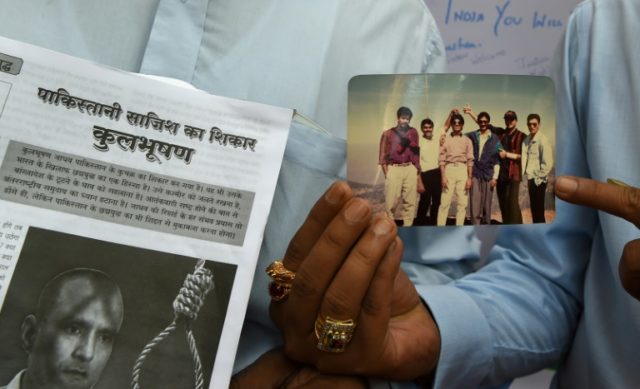The Hague (AFP) – An Indian man on death row in Pakistan for alleged spying committed “terrorist acts” including targeted killings and kidnappings on New Delhi’s orders “to create anarchy”, Islamabad’s lawyers told UN’s top court on Tuesday.
Islamabad’s lawyers opened their case on the second day of hearings at the International Court of Justice, where they are involved in a tense legal stand-off with bitter rival India in the case of Kulbhushan Sudhir Jadhav.
The hearings before The Hague-based ICJ coincide with a sharp spike in tensions between the two nuclear-armed neighbours after a suicide bombing in restive Kashmir last week and renewed fighting there on Monday.
Jadhav, 48, was sentenced to death by a Pakistani military court in 2017, with New Delhi dragging Islamabad to the ICJ — set up in 1946 to rule in disputes between countries — over the case.
A former navy commander, Jadhav was arrested in the restive southwestern province of Baluchistan in 2016 and in 2017 the ICJ issued an urgent order telling Pakistan to stay his execution.
– ‘Creating anarchy’ –
On Tuesday, Pakistan’s Attorney General Anwar Mansoor Khan told ICJ judges that Jadhav ran a network “to carry out despicable terrorism and suicide bombing, targeted killing, kidnapping for ransom and targeted operations to create unrest and instability in the country”.
“His unlawful activities were directed at creating anarchy in Pakistan and particularly targeted the China-Pakistan corridor,” Khan told a 15-judge bench.
But Jadhav did not act on his own, Khan added.
“Rather they were committed at the behest of the Indian state and the government.”
A confession by Jadhav obtained by Pakistani officials “speaks of India’s state policy of sponsoring terrorism in Pakistan,” he said.
Since independence from Britain in 1947 “India has persistently pursued the policy of trying to destroy Pakistan,” Khan said.
– ‘Political theatre’ –
India renewed its arguments Monday around the sensitive issue of Jadhav’s arrest and death sentence, insisting he was not a spy and that he was kidnapped in Pakistan.
New Delhi on Monday told judges that Jadhav’s rights were violated during his trial and that India had no consular access to its citizen.
New Delhi’s lawyers asked judges at the ICJ, also called the World Court, to order Pakistan to free Jadhav immediately.
But on Tuesday, another Pakistani lawyer Khawar Qureshi told the court: “India’s proceedings… are purely for political theatre… and they should be dismissed.”
New Delhi’s move in the controversial case comes as fresh bloodshed in Kashmir sent tensions between the nuclear-armed neighbours soaring.
The rare foray into the international courts by India and Pakistan could be another flashpoint after Thursday’s suicide bombing in Indian-administered Kashmir that killed 41 troops.
Indian troops suffered new losses Monday in a fierce battle with Kashmir militants that left at least nine more dead, including four soldiers.
The latest confrontation piled more pressure on the Indian government to act, which has blamed Pakistan for the suicide attack that sparked widespread calls for action against its neighbour.
Pakistan has rejected the allegations.
Jadhav was accused of working for the Indian intelligence services in the province bordering Afghanistan, where Islamabad has long accused India of backing separatist rebels.
After a closed trial he was sentenced to death by a Pakistani military court on April 10, 2017, on charges of “espionage, sabotage and terrorism”.
The ICJ’s decision will likely come months after this week’s hearings.
Kashmir has been split between India and Pakistan since independence from Britain in 1947 with both countries, which have fought three wars, claiming it as their own.
India and Pakistan routinely accuse each other of sending spies into their countries and it is not uncommon for either nation to expel diplomats accused of espionage, particularly at times of high tension.
Death sentences however have been rarely issued in recent years.
jhe/txw

COMMENTS
Please let us know if you're having issues with commenting.